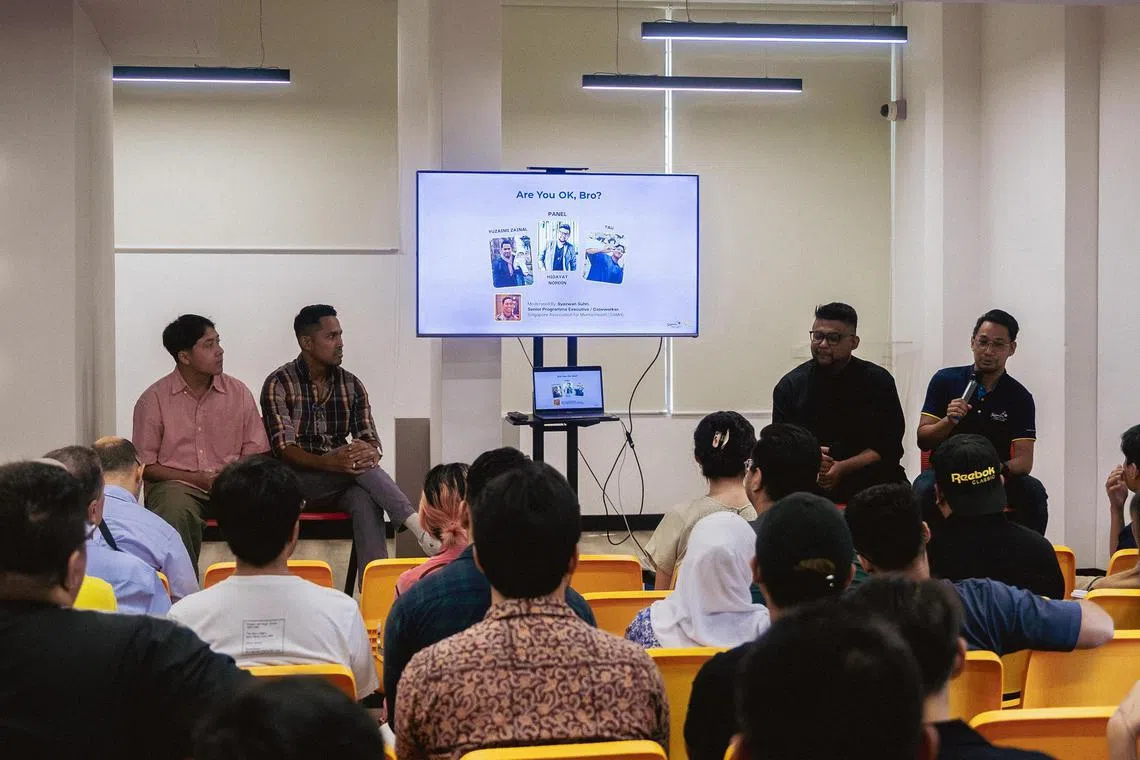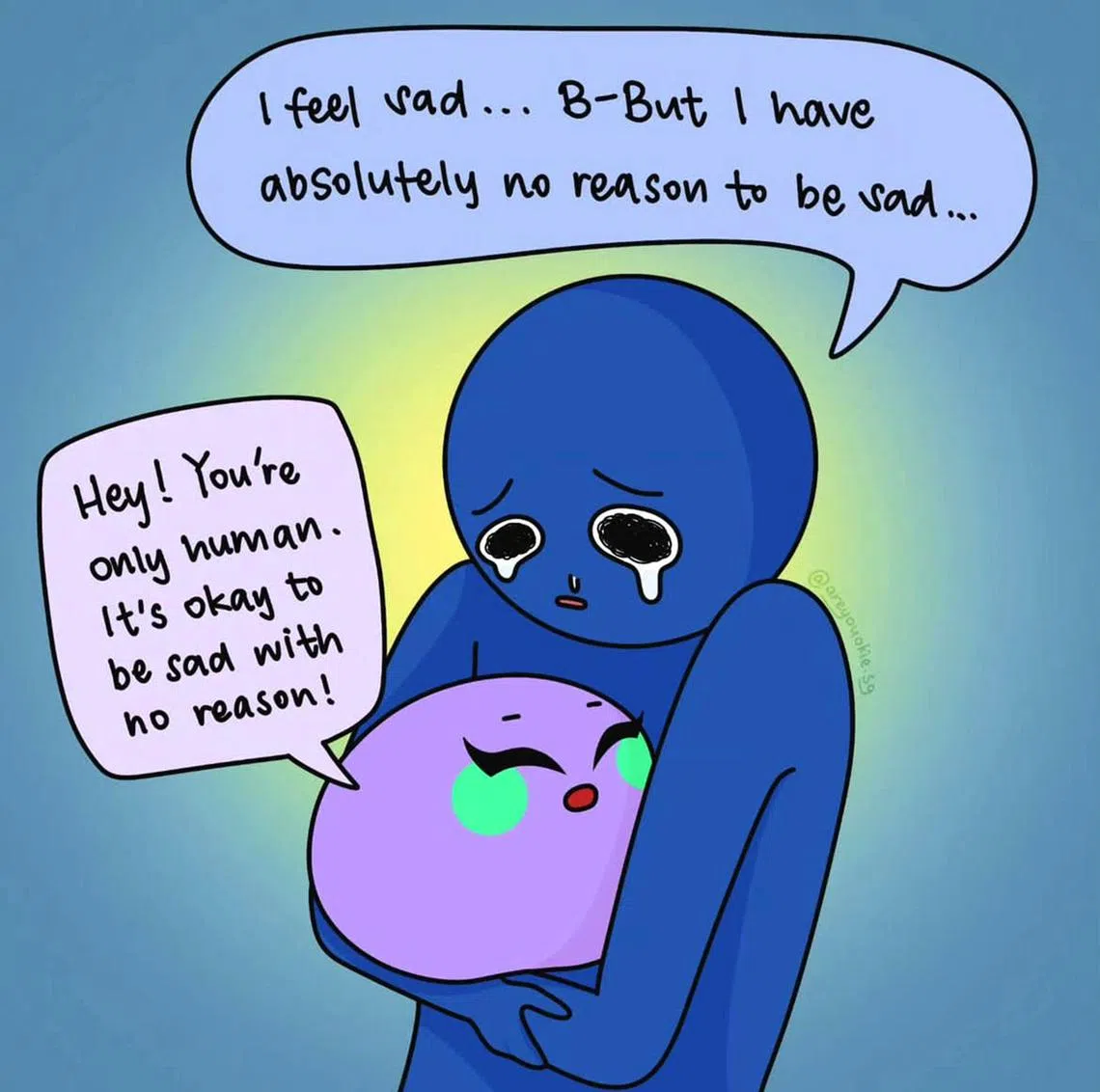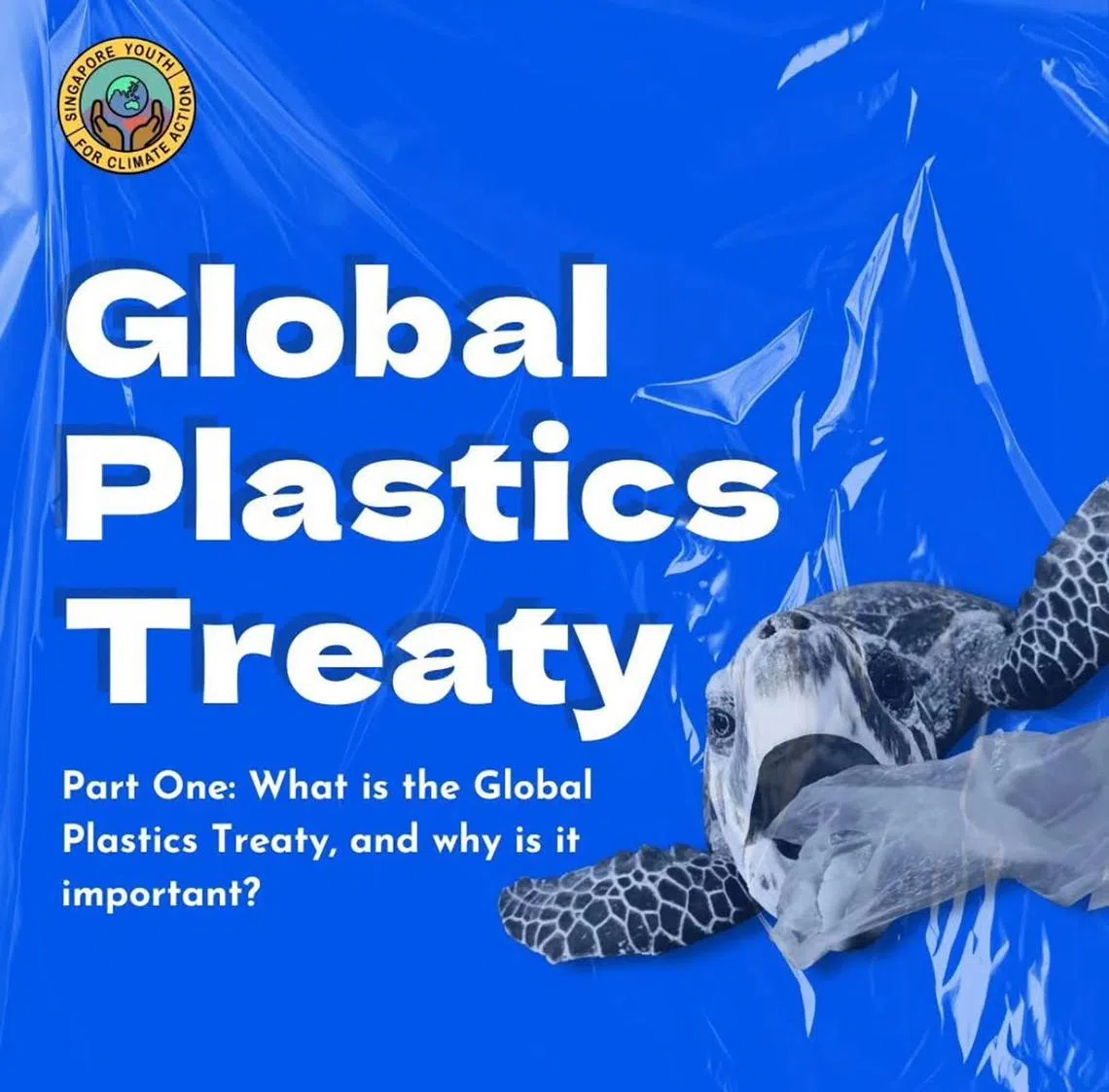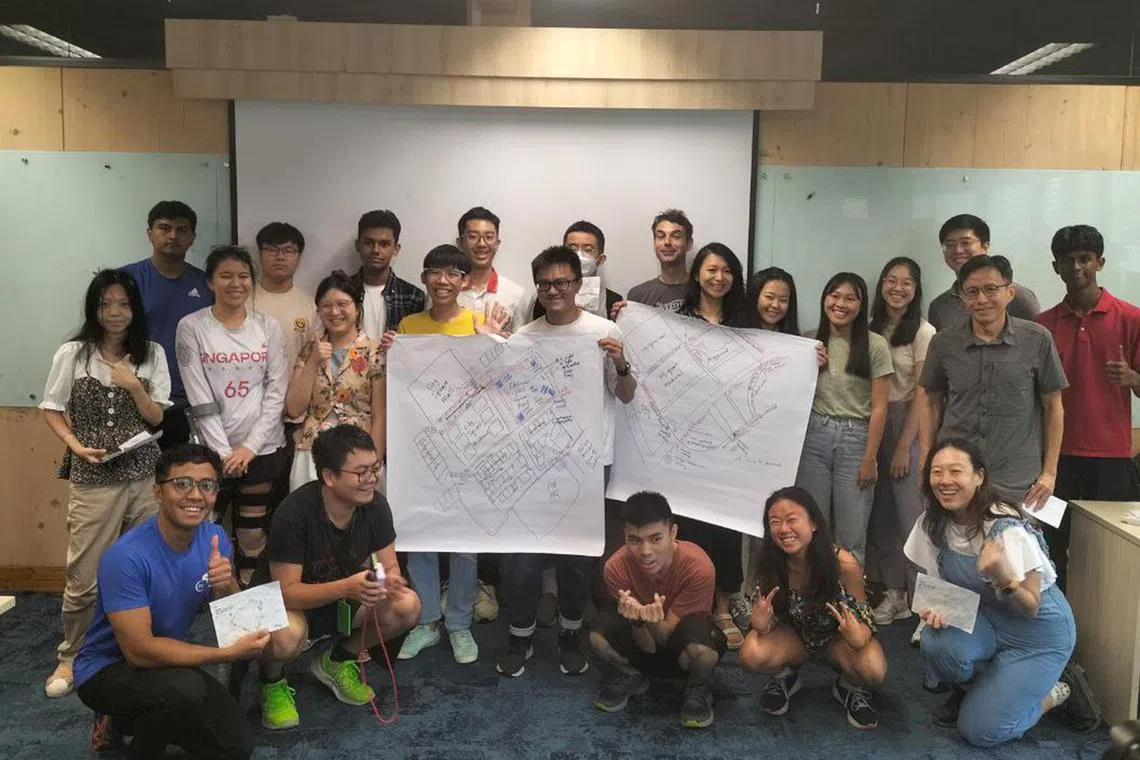Doing advocacy the Gen Z way – via social media and with quiet determination
Sign up now: Get ST's newsletters delivered to your inbox

LepakConversations' Are You OK, Bro? workshop on emotional well-being for Malay men, held on Oct 14, 2023.
PHOTO: MARC CLARENCE
SINGAPORE – Signs and placards are but a small part in Gen Z’s arsenal for activism.
An increasing number of young adults aged 22 to 27 is taking to social media to champion causes such as climate change, mental wellness and minority rights.
By using infographics, art and dialogues to do so, these young advocates take a gentle but determined approach, posting as often as daily, to show that activism need not be shrill to be impactful.
These Gen Z activists are paving the way for change with their artistic, PowerPoint-styled digital footprints, showing a softer side to advocacy that still gets the job done.
LepakConversations: Lepak, talk, change
Its Instagram handle challenges the stereotype of a screaming activist.
@LepakConversations on Instagram aims to bring Malay/Muslim issues to the fore through conducting dialogues online and offline. Tackling issues such as stereotypes against Malays, migrant worker rights and allyship beyond the Malay community, the organisation was co-founded by freelance social media consultant Yulianna Frederika in 2020.
Since then, the fully volunteer-run team has expanded from the two founders to 12 members, comprising researchers, designers and event planners.
With more than 10,000 followers on Instagram, the group posts a few times a week, using Instagram Live, stories and its comments section to facilitate discussion.
It currently features Are You OK, Bro? 2.0, a three-part physical workshop on Malay male mental health, in collaboration with Club HEAL, a non-profit organisation that supports those with mental health issues.

Civil servant Naufal Zahin Azmi, who is part of the LepakConversations team as a researcher, says he was drawn to the group’s conversational-style advocacy.
PHOTO: COURTESY OF NAUFAL ZAHIN AZMI
One of LepakConversations’ team members is Mr Naufal Zahin Azmi, 27, a civil servant who joined the group in June as a researcher. Its “bite-size” and “palatable” approach to issues such as cultural appropriation and the mental health of racial minorities won him over.
“The traditional image of advocacy might evoke scenes of civil or non-civil disobedience, like demonstrations. However, through conversations and dialogues, we adopt a softer approach,” he says.
Previously, he, like many others, had the misconception that advocacy was about “big, visible actions”.
But after attending a few hour-long live chats organised by the group – which addressed what it means to build a community and the idea of tolerance versus acceptance in a multiracial society – he realised that meaningful, honest conversations were just as capable of bringing about change.
For instance, LepakConversations’ first physical event, titled Kemelayuan: What Does It Mean To Be Malay Today, sold out within two days. At the dialogue held on July 2, 2022, Mr Naufal, along with about 24 participants, came to the understanding that there is no one way to be Malay because every parent’s identity is unique and so, too, are their children’s.
“By engaging in meaningful dialogues, we can build a more comprehensive understanding and foster genuine connections, making our advocacy efforts more effective and inclusive,” he says.
On LepakConversations’ growth over the past five years, Mr Naufal says: “I think this is the result of the advent of technology and the changing preferences from a community that is increasingly distanced spatio-temporally.”
This became more evident during the Covid-19 pandemic, he says, when LepakConversations held all its initial dialogues online.
Another reason for the group’s approach is simply necessity.
“There isn’t much space to execute conventional advocacy methods in our city,” Mr Naufal says, recalling how his earlier advocacy efforts were confined to writing articles and sharing content on his personal social media.
Ms Fezhah Maznan, 39, joined LepakConversations in 2023 as a volunteer because she was intrigued by its Gen Z-run nature and how it engaged with communities and advocated for migrant workers.
“I saw the impact not from the number of likes it gets on its posts, but how the work that it does resonates with me and is aligned with my personal values and concerns,” says the creative producer and dramaturg who is based in Los Angeles, in the US.
Mr Naufal acknowledges there is scepticism that all the group does is surface intractable problems and bellyache about them. First, he posits that “complaining, when done constructively, can have benefits”, citing complaints as catalysts for deeper discussions.
Second, true to the collective’s name, Mr Naufal invites naysayers to have a chat about it.
“Engage with us, understand our perspectives, and join us in our mission to create a more equitable and sustainable world.”
AreYouOkie.sg: Creating mascots that cheer you on

AreYouOkie.sg’s trademark blobs, which represent the “ever-evolving human experience”, dot its Instagram feed.
PHOTO: AREYOUOKIE.SG/INSTAGRAM
At first glance, AreYouOkie.sg’s Instagram feed looks like an art account, with its homogenous pastel palette complete with cartoon-style Original Characters (OCs) doodles.
But click on each post and you will find a sea of information on all things self-care and mental wellness.
Co-founder Lionel Fong, 24, a final-year arts management student at Lasalle College of the Arts, started the account with his friend, Ms Xen Ng, in 2022.
Their objective was to demystify mental illness, promote mental wellness, and integrate art and information to make the sometimes “dry” and “real” mental health content more “palatable” and “accessible”.
“Through our content, people can realise that mental wellness is not that complicated, nor (does it) have to be time-consuming,” he says.
Some suggestions it surfaces include taking power naps to recharge, disconnecting from the internet and ways to deal with emotional burnout.

AreYouOkie.sg’s trademark blobs.
PHOTO: AREYOUOKIE.SG/INSTAGRAM
Another key feature of AreYouOkie.sg is its mascots – blobs of purple, blue and yellow that have become synonymous with the platform and which are drawn by its resident artist, known as@xxtgmm.__.
These shapeless blobs represent the “ever-evolving human experience” and have since been handmade into merchandise such as crocheted stress balls.
Sold at $10 each, the stress balls were launched in June 2023, during AreYouOkie.sg’s first pop-up at the Self-Care Emporium, an event Mr Fong and Ms Ng planned alongside Cocoachnutty on Instagram, another local social enterprise that tackles well-being.
“Given how versatile a blob shape can be, it represents how everyone goes through a different life journey and is unique in his or her own way,” says Mr Fong.
The account has garnered 800 followers since its inception and is often referred to by its acronym, AYO. This makes Mr Fong feel that his efforts posting a few times a month and “forging interpersonal connections” are well worth it.
“You never know if one day our post – just one social media post – could make a difference to somebody.”
Singapore Youth For Climate Action: A climate of change

With its social media content, the Singapore Youth For Climate Action aims to engage youth on topics of sustainability and empower them to advocate for equitable climate policies.
PHOTO: SYCLIMATEACTION/INSTAGRAM
To appeal to more people, Singapore Youth For Climate Action (SYCA) uses infographics to spice up dry information on climate and the environment.
Its Instagram page of the same name explains terms such as carbon tax and Singapore’s role in global environmental treaties.
Started in 2015, the SYCA describes itself as a network of young people with the common goal of fighting climate change.
The main aims of the organisation include engaging youth on topics of sustainability and empowering them to advocate for equitable climate policies.
It also partners stakeholders such as the National University of Singapore (NUS) to educate the public on climate matters.
With more than 2,000 followers on Instagram, the SYCA takes care to be “intentional” about its monthly posts, ensuring that its discourse is relevant to the Singaporean context.
“Singapore has a different context both in terms of climate and our political landscape,” notes Mr Vareck Ng, 22, an incoming freshman at the National Institute of Education, who works on SYCA’s social media.
“The potential for renewable energy is lower here relative to (other) countries,” he adds.
Therefore, the SYCA opts for emphasising the circular economy, a business model that minimises waste, such as by buying second-hand rather than new.

The Singapore Youth For Climate Action held a workshop on July 7 at the Singapore Sustainability Academy, where participants were encouraged to reimagine a sustainable street.
PHOTO: COURTESY OF VARECK NG
Every few months, SYCA organises physical events such as interactive workshops.
It held one on July 7 at the Singapore Sustainability Academy, where 23 participants were encouraged to reimagine safer streets and more eco-friendly living.
Since joining the team in 2023, Mr Ng says his experience has changed the way he views activism.
“I no longer see activism as a dirty word, but as a way of engaging others in current affairs and bringing out positive social changes.”
Informedqueers: In online advocacy, less is more

The Informedqueers account on Instagram focuses on the intersectionality between race, gender and sexuality.
PHOTO: INFORMEDQUEERS/INSTAGRAM
For Unicorn (who declines to reveal her real name and asked to be known as this alias), her Instagram account @Informedqueers
Initially started by Unicorn and a friend in 2019, the account centred on sharing resources such as helplines and text posts to help those facing discrimination based on their sexuality and/or gender identity in daily life.
After a hiatus between 2021 and July 2024, Unicorn, who is of a minority race here, returned to run the 200-follower account alone. It now focuses on the intersection between race, gender and sexuality.
“Back then, we were too scared to attend any social/political events because our parents would say something or we felt like people (would) shun us,” she says.
Even now, she remains cautious, going by an alias on the page and declining to give any personal information for this interview.
During the account’s three-year hiatus, Unicorn says she gathered the courage to attend physical events, most notably talks about LGBTQIA+ and mental health. There, she met other advocates who inspired her to revive her account.
“I needed somewhere to talk louder,” she says, adding that because very few friends in her circle know about her online advocacy, she feels safer sharing on her account instead.
She sees her role as providing a “larger platform to educate” the public and maintains that education is the core of advocacy.
“In order to educate people or expect change, you need to tell people why, what are the negative impacts, how to help and so on,” she says.
Tapping the research skills she gained from her nursing diploma, Unicorn says she makes sure to “research” her sources, which she then distils into six to seven slide-text posts for her followers up to five times a month.
She is active on Instagram Stories, spreading awareness on topics such as Disability Pride Month, which takes place every July and celebrates the diversity of those who are physically or mentally disabled.
“If you talked more about one topic, you could do more with it, and change could happen,” she says.
Future of social media advocacy
According to Dr Zhang Renwen, assistant professor in the department of communications and new media at NUS, social media advocacy goes back longer than many realise.
“Between 2004 – when Facebook launched – and the present, social media has democratised the ability to advocate for causes,” says the avid social media and online community researcher.
Citing the #MeToo movement as an example, Dr Zhang notes that social media amplified the impact and reach of advocacy efforts, reaching 19 million retweets in its first year worldwide.
The younger generation is particularly adept at harnessing social media “to voice their opinions and rally support globally”, she notes.
Online marketing agency X10 Media’s regional business director Sky Lim agrees with this sentiment, adding: “Because of the ease of accessibility, social media platforms have a higher penetration and allow for like-minded people to connect with one another, resulting in active micro-communities.”
The interactivity of comments and messages also helps in the formation of such communities.
For accounts looking to expand the reach of their advocacy, Mr Lim has this advice: “Authenticity is key in today’s social media scene.” Creativity in articulating a cause, such as by using “humour, skits or a sentimental human story”, also helps.
But with great power comes great responsibility, says Dr Zhang.
She cautions against misinformation and “slacktivism”, which she defines as “low-effort activities, such as sharing a post, rather than taking substantive action”.
Ultimately, quality trumps quantity when it comes to online advocacy.
Dr Zhang’s advice for young keyboard warriors: “It’s important to set online boundaries, prioritise self-care through offline activities, delegate tasks to share the workload, use tools to limit screen time, and focus on meaningful engagement rather than try to keep up with all interactions.”


